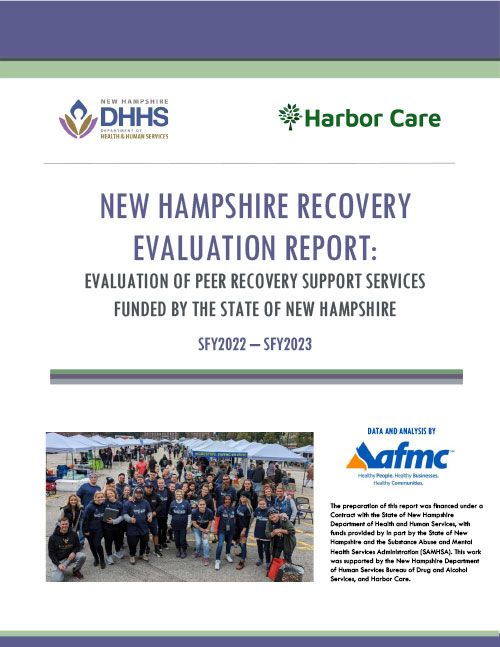Recovering Together
The power of recovery is an extraordinary force that has the potential to transform lives, families and communities. It empowers individuals to break free from the clutches of addiction, supporting them in their journey towards healing and self-discovery. Recovery creates a community of unwavering support, reminding individuals that they are not alone in their struggle.
We celebrate the triumphs of those who have embraced recovery. Their resilience and hope inspires us.
Recovery is possible, hope is essential.

New Hampshire Recovery Community Organizations (RCOs)
New Hampshire Recovery Evaluation Report
This document, created by AFMC, details the evaluation of recovery outcomes and the impact of Peer Recovery Support Services (PRSS) in New Hampshire. It highlights the association between increased recovery capital and engagement in PRSS, such as attending meetings and advocacy activities. The report emphasizes the importance of family engagement and physical activities in improving recovery outcomes, showcasing significant statistical analyses and recommendations for enhancing recovery support services across the state..
 An initial evaluation of state-funded peer recovery support services (PRSS) was conducted using data from SFY2021. Results from those analyses served as a baseline for future evaluations and indicated that PRSS and other activities facilitated by the RCOs were effective in increasing recovery capital.
An initial evaluation of state-funded peer recovery support services (PRSS) was conducted using data from SFY2021. Results from those analyses served as a baseline for future evaluations and indicated that PRSS and other activities facilitated by the RCOs were effective in increasing recovery capital.
 An initial evaluation of state-funded peer recovery support services (PRSS) was conducted using data from SFY2021. Results from those analyses served as a baseline for future evaluations and indicated that PRSS and other activities facilitated by the RCOs were effective in increasing recovery capital.
An initial evaluation of state-funded peer recovery support services (PRSS) was conducted using data from SFY2021. Results from those analyses served as a baseline for future evaluations and indicated that PRSS and other activities facilitated by the RCOs were effective in increasing recovery capital.
 An initial evaluation of state-funded peer recovery support services (PRSS) was conducted using data from SFY2021. Results from those analyses served as a baseline for future evaluations and indicated that PRSS and other activities facilitated by the RCOs were effective in increasing recovery capital.
An initial evaluation of state-funded peer recovery support services (PRSS) was conducted using data from SFY2021. Results from those analyses served as a baseline for future evaluations and indicated that PRSS and other activities facilitated by the RCOs were effective in increasing recovery capital.
 An initial evaluation of state-funded peer recovery support services (PRSS) was conducted using data from SFY2021. Results from those analyses served as a baseline for future evaluations and indicated that PRSS and other activities facilitated by the RCOs were effective in increasing recovery capital.
An initial evaluation of state-funded peer recovery support services (PRSS) was conducted using data from SFY2021. Results from those analyses served as a baseline for future evaluations and indicated that PRSS and other activities facilitated by the RCOs were effective in increasing recovery capital.
Free Services Available at RCOs
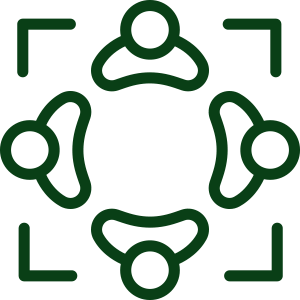
Mutual Support Groups
Every recovery community center makes space available for a variety of recovery groups including 12-step, SMART Recovery, and All Recovery groups as well as family support groups. Contact providers directly to learn more about scheduled meetings.
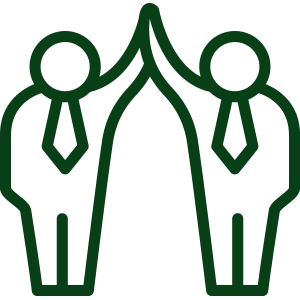
Peer Recovery Support Specialists
Services provided by trained peers who serve as guides and mentors to individuals seeking or in recovery in order to assist those individuals with developing a recovery plan and removing barriers.
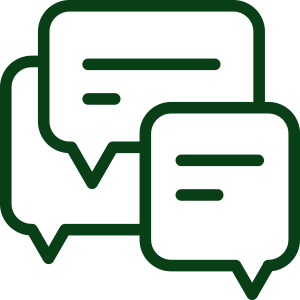
Multiple Means of Communication
Scheduled and as needed telephone contacts that provide peer support and encouragement as well as information about community resources, mutual support groups and other supports that may be available to individuals in or seeking recovery. Some RCOs also have IMs or reply to questions on social media channels.
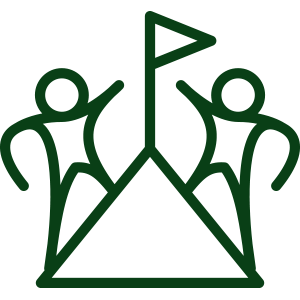
Healthy Living Groups & Recovery Activities
Peer Recovery Support Service providers offer a wide range of healthy living groups and activities. These groups may take the form of gardening or yoga activities, art instruction, musical presentations, financial literacy, goal setting, work readiness training and more.
New Calendar Format: Find Your Next Event Fast!
In the world of addiction recovery, the role of recovery coaches and certified recovery support workers (CRSWs) is pivotal in guiding individuals towards a healthier, substance-free lifestyle.
This online calendar is designed specifically for recovery coaches and certified recovery support workers.
This tool simplifies ways to search for essential training classes, including peer recovery support skills, suicide prevention, relapse prevention, and motivational interviewing, among others.
Whether you are a concerned loved one or a working professionals, these classes will enhance your abilities, deepen your understanding of addiction recovery, and provide a framework for building effective support to individuals seeking to rebuild their lives.
Access the Events Calendar
Featured Videos
This video tackles the serious topic of suicide, showing that it’s not just about mental illness.
It’s important to understand how and why suicide happens. Preventing suicide means looking at different factors: things that stay the same (like age and gender) and things that can change. Protective factors, like having friends and a good relationship with a therapist, can help.
About the Facilitating Organization
Harbor Care (previously known as Harbor Homes) began working with New Hampshire’s Bureau of Drug and Alcohol Services in 2016 to help the state develop Recovery Community Organizations (RCO) and Peer Recovery Support Services (PRSS) to aid people recovering from substance use disorder.
These organizations, known in other places as Recovery Community Centers (RCCs), fill gaps in addiction treatment and recovery support. New Hampshire’s approach of funding a Facilitating Organization to build a collaborative workforce of community-based PRSS providers has improved care for those affected by addiction.
While the PRSS field is new to New Hampshire and is an emerging field nationally, it has shown better outcomes for participants before, during, and after traditional addiction treatment (and has a rich history predating addiction treatment).
As of August 2023, the FO manages a single contract with different funding sources like SORII, Governor’s Commission on Alcohol and Other Drugs, General Funds, and Block Grant dollars. The contract is watched over by the NH Department of Health and Human Service (DHHS), Bureau of Drug and Alcohol Services (BDAS).
This contract streamlines payments for 19 RCCs. In many instances, the PRSS FO contract supports roughly 67% of RCOs’ annual budgets.
RCOs also get their own grants and funds that aren’t managed by Harbor Care, but the FO contracts provides security needed for budging.
The FO ensures RCOs supported by tax dollars are well-prepared through a variety of practical and useful training sessions. These trainings help improve how PRSS is provided and how organizations are run. The program has completed a total of 36 sessions in FY 2022, which adds up to over 130 hours of training. The list below shows some of the topics that have been covered.
Here are the trainings we provided in 2023:
- Learning About Ethics for Recovery Coaches
- How to Prevent HIV/AIDS
- Preventing Suicides
- Supporting Families in Recovery
- Using RecoveryLink for Data Entry
- Understanding RecoveryLink Outcomes
- Learning Excel Functions
- Being Aware of IT Security
- Getting to Know the FO Subcontractor
- Rules for Peer Supervision
- Preventing Crisis Situations
- Moving Forward in Recovery
- First Aid for Mental Health
- Learning Impactful Leadership
- Basics of Addiction
See the calendar on the New Hampshire Recovery Hub’s homepage or individual pages Advanced Boot Camp, Recovery Trainings, Ethical Considerations, Events, HIV / Hep-C, Motivational Interviewing, or Suicide Prevention to learn more about upcoming trainings.
Harbor Care, as the FO, is responsible for providing various kinds of helpful tasks, including behind-the-scenes support. This makes sure that small grassroots and non-profit groups have what they need to run smoothly. The FO provides different kinds of support, like coaching to help the organization, getting things set up, helping with paperwork, collecting and looking at data, and making things better, all based on what each RCO needs.
Each RCO has been successful in leveraging FO funds for service contracts and grants which expand their scope of work. A majority of subcontracted RCO’s receive additional funding for a variety of programs including but not limited to recovery coaching in the emergency department, probation and parole relationships, Recovery Friendly Workplace initiatives, homeless outreach, etc. All RCO’s are in close working relationships with their regional Doorways. However, most RCOs still face capacity issues related to their expanded roles in their communities.
